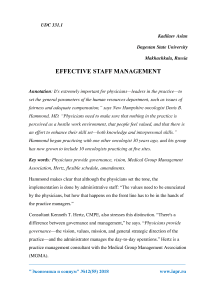Effective staff management
Автор: Kadilaev A.
Журнал: Экономика и социум @ekonomika-socium
Рубрика: Основной раздел
Статья в выпуске: 12 (55), 2018 года.
Бесплатный доступ
It's extremely important for physicians-leaders in the practice-to set the general parameters of the human resources department, such as issues of fairness and adequate compensation,” says New Hampshire oncologist Denis B. Hammond, MD. “Physicians need to make sure that nothing in the practice is perceived as a hostile work environment, that people feel valued, and that there is an effort to enhance their skill set-both knowledge and interpersonal skills.” Hammond began practicing with one other oncologist 30 years ago, and his group has now grown to include 10 oncologists practicing at five sites.
Physicians provide governance, vision, medical group management association, hertz, flexible schedule, amendments
Короткий адрес: https://sciup.org/140241071
IDR: 140241071
Текст научной статьи Effective staff management
Hammond makes clear that although the physicians set the tone, the implementation is done by administrative staff: “The values need to be enunciated by the physicians, but how that happens on the front line has to be in the hands of the practice managers.”
Consultant Kenneth T. Hertz, CMPE, also stresses this distinction. “There's a difference between governance and management,” he says. “ Physicians provide governance —the vision, values, mission, and general strategic direction of the practice—and the administrator manages the day-to-day operations.” Hertz is a practice management consultant with the Medical Group Management Association (MGMA).
In addition to establishing values of fairness and consistency, the physician owners are responsible for ensuring that appropriate procedures are in place to attract and retain high-quality staff. During the final stages of hiring top management staff, physicians should be involved in the interviewing process.
In hiring the practice's top administrator, Hertz advises, “You've got to find someone who has the same values as the practice. In addition to the essential skill set, look for someone who has a personal mission that is in sync with that of the practice, and whose personality and style fit within the practice.” To learn the skills and experience your administrator should have, Hertz suggests referring to Body of Knowledge for Medical Practice Management (see Additional Resources), an MGMA publication that describes competencies required in eight domains, from business operations and financial management to patient care systems and organizational governance. “Within this framework, you can drill down to very tactical levels that can help you create interview questions,” Hertz notes.
The practice's compliance with regulations— from privacy and security rules related to the Health Insurance Portability and Accountability Act to sexual harassment laws and restrictions related to the Clinical Laboratory Improvement Amendments —is also your responsibility as a physician owner. Set the pace by conveying to staff that you respect these laws. If you trivialize or make disparaging remarks about these regulations, this attitude will permeate the staff and put your practice at unnecessary risk.
Finally, physicians should not air their disagreements with one another or with the practice manager in front of other employees. Although this problem is easily preventable, physician leaders report that too many physicians are unaware of their own rude behavior in front of staff. Expressing such disagreements publicly rather than privately can erode esprit quickly.
Retention of good employees is especially important because of the costs, both tangible and intangible, of replacement. Changes in staff disrupt the flow of work, change the established lines of communication, and place a burden on the employees who have to fill in.
“Turnover is very expensive, especially in oncology practice, because it's so difficult to find people with oncology experience,” Falconer points out. “When you lose someone, you're not going to be able to replace them with someone with anywhere near the experience of the one you lost.”
According to the MGMA, the cost of replacing an employee is 50% to 150% of the annual salary for that position (the higher percentages apply to replacing managers); thus, it can cost your practice from $25,000 to $75,000 to replace an employee with a yearly salary of $50,000. The costs of recruiting, hiring, training; the use of temporary workers; and the productivity lost during the new employee's first 6 months all contribute to this expense.
Falconer stresses that it is not just a competitive hourly wage that helps retain employees, but rather the whole compensation package. “By having a comprehensive benefits package, you keep them from being recruited away,” she says. Falconer considers including health care insurance to be an absolute minimum requirement.
Retirement benefits are another component of compensation that can be especially important in rewarding employee longevity. Falconer suggests structuring a 401K program with an employer contribution component so employees know that the longer they stay, the more rewarded they will be.
A flexible schedule is another extremely helpful tool for recruitment and retention, and one that sometimes gives medical practices an advantage over other businesses, because of the ability to control patient scheduling. Such a schedule might give employees the option of working longer hours on 4 days and having 1 day off a week. A plus of flexible scheduling is that employees can plan their appointments and other errands for their day off work, thus reducing the frequency of unplanned absences.
A good benefits package and a flexible schedule contribute to job satisfaction and thereby to increased productivity as well as longevity. “So many physicians that I've worked with see just the expense side of providing comprehensive benefits,” Falconer notes. “They need to understand how costly it is not to provide them.”
Список литературы Effective staff management
- www.ncbi.nlm.nih.gov
- http://edutechwiki.unige.ch
- http://www.ittoday.info/Articles/ITTarchives.htm#IT


